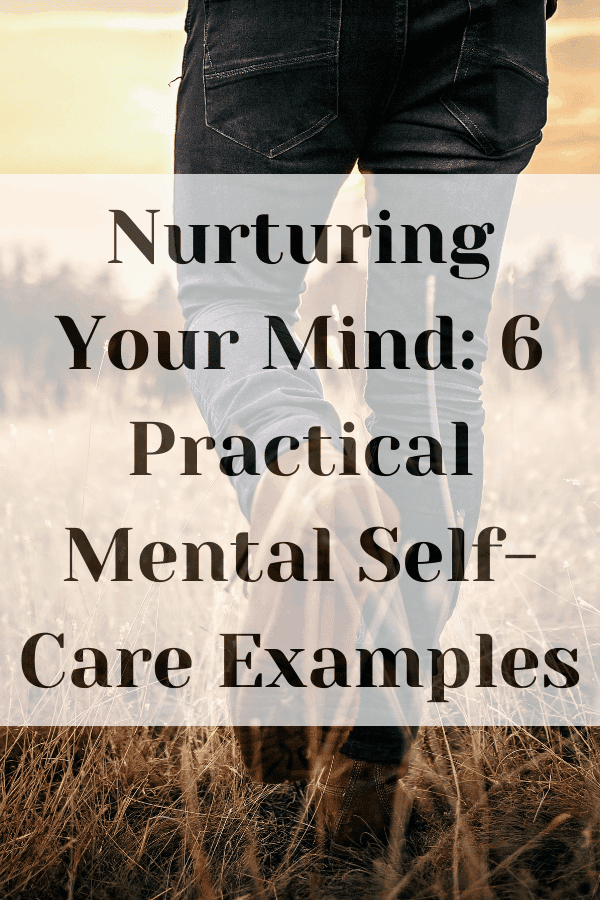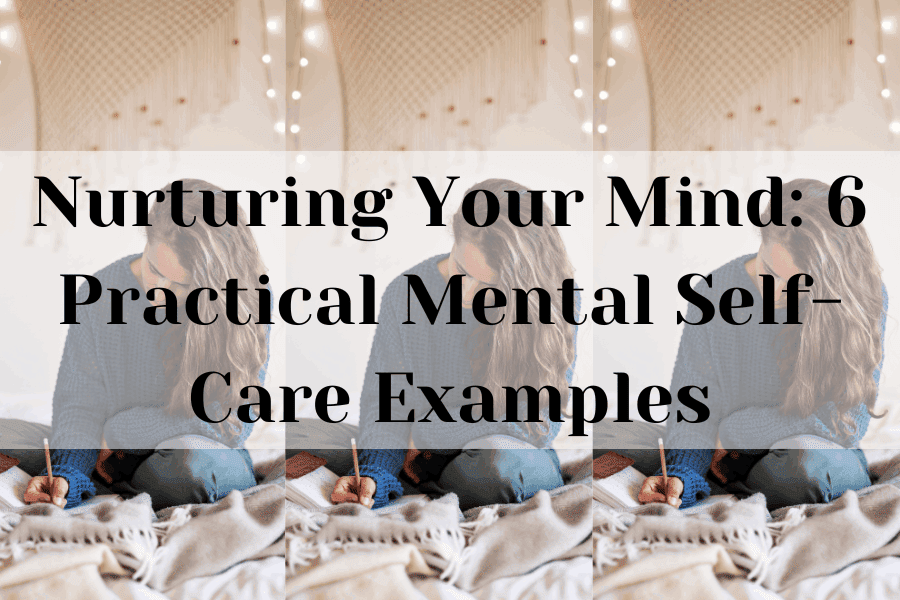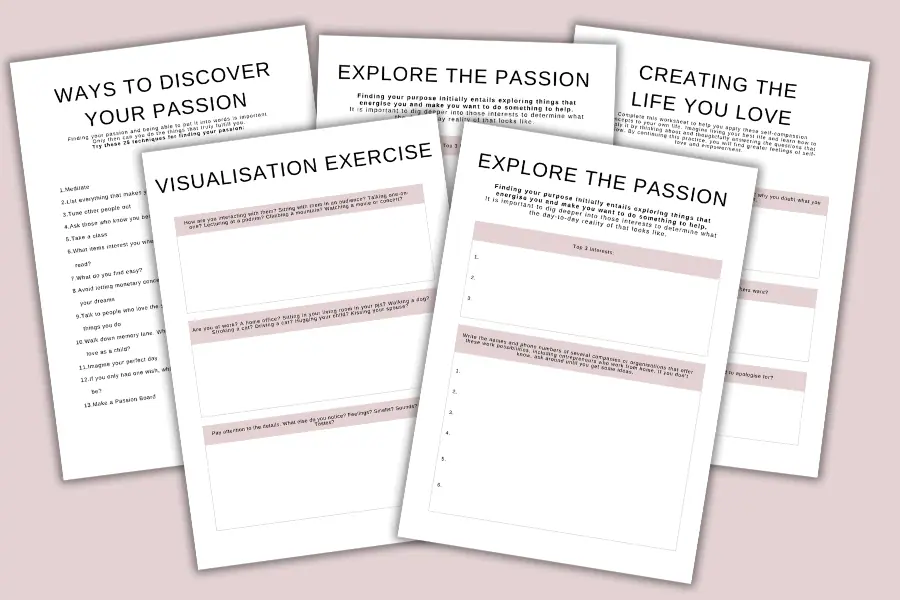Nurturing Your Mind: 6 Practical Mental Self-Care Example

In this blog post, we’ll explore a variety of simple yet powerful mental self-care examples that can make a world of difference in how you feel and navigate through life. We’re here to guide you with a friendly and calming approach, offering practical tips that you can easily incorporate into your daily routine.
In today’s fast-paced world, it’s easy to get caught up in the hustle and bustle, often neglecting our mental well-being in the process. That’s why understanding and embracing mental self-care is crucial. It’s like giving your mind a much-needed spa day!
Remember, mental self-care isn’t about extravagant or time-consuming practices. It’s about small, consistent steps that add up to a happier, healthier you.
This blog post is about mental self-care examples

Mindful Breathing and Relaxation Techniques
In the hustle and bustle of our daily lives, our minds often run at a million miles per hour. That’s where is important to have mental self-care examples, such as mindful breathing and relaxation techniques come in. They serve as a reset button for our overworked minds, allowing us to find a sense of calm amidst the chaos.
How it works
Imagine your mind as a turbulent sea, full of waves and commotion. Deep breathing acts as the anchor, grounding you and bringing stillness to the surface. By focusing on your breath, you draw your attention away from worries and stressors, creating a tranquil space within.
A simple breathing exercise
Find a quiet space
Choose a comfortable spot where you won’t be disturbed.
Get comfortable
Sit or lie down in a relaxed position. Close your eyes if you feel comfortable doing so.
Inhale slowly
Take a deep breath in through your nose, counting to four as you do so. Feel your chest and abdomen rise.
Hold your breath
Gently hold your breath for a count of four.
Exhale slowly
Release the breath slowly through your mouth, counting to four. Feel the tension leave your body.
Repeat
Continue this cycle for a few minutes, allowing each breath to wash over you like a soothing wave.
Example scenarios
Before a stressful meeting
Take a moment in your car or a quiet corner to centre yourself before entering the meeting room.
In bed before sleep
Use this technique to clear your mind and prepare for a restful night’s sleep.
During a hectic day
Sneak away for a few minutes to reset and recharge, even if it’s just in a bathroom stall.
Remember, this practice is like a mini-vacation for your mind. It’s always there, ready to bring you back to a place of peace whenever you need it. Try it out and see the magic it can work in your daily life.
Daily Affirmations and Positive Self-Talk
In the grand scheme of self-care, our minds thrive on positive reinforcement. Daily affirmations and positive self-talk are like a gentle pat on the back from yourself, reminding you of your worth and capabilities.
The power of positive affirmations
Positive affirmations are more than just feel-good phrases. They have the remarkable ability to shape our beliefs and attitudes. By consistently repeating affirmations, you’re rewiring your brain to believe in your strengths and potential. This practice not only bolsters self-esteem but also acts as a shield against stress, helping you face challenges with a confident stride.
Examples of affirmations for various situations
For a challenging day
“I am capable, strong, and resilient. I can handle anything that comes my way.”
Embracing self-worth
“I am deserving of love, respect, and success. I believe in my own value.”
Overcoming doubt
“I trust in my abilities and believe in myself. I am worthy of success.”
Cultivating positivity
“I radiate positivity and attract good things into my life. I am a beacon of light.”
Tips on integration into daily routines
Morning ritual
Start your day by reciting affirmations. Whether in front of a mirror or during your morning routine, this sets a positive tone for the day.
Post-it reminders
Place affirmations on sticky notes in prominent places—on your desk, bathroom mirror, or fridge—for regular reinforcement.
Pause and reflect
Take a moment during the day to silently repeat affirmations, especially when faced with challenges.
Nighttime reflection
End your day with affirmations. Reflect on your achievements and remind yourself of your worthiness before drifting into sleep.
Remember, affirmations are like seeds you plant in the garden of your mind. With care and consistency, they grow into a flourishing forest of confidence and positivity. So, let these gentle reminders become a regular part of your self-care routine. You’ll be amazed at the transformation they bring.
Engaging in Creative Outlets
Amid the whirlwind of our daily lives, there exists a sanctuary of solace: creative outlets. Engaging in artistic pursuits offers a unique form of mental self-care, providing a canvas for expression and a refuge for the mind.
Benefits of creative activities
Delving into creative endeavours isn’t merely a pastime; it’s a form of therapy for the soul. When you immerse yourself in painting, writing, or crafting, you enter a meditative state, where the outside world fades away, leaving room for introspection and self-discovery. This meditative state has been proven to reduce stress, increase mindfulness, and promote a sense of accomplishment.
Examples of creative outlets
Painting or drawing
Whether you’re an aspiring artist or simply wielding a brush for the first time, the act of putting colour to canvas can be a profoundly soothing experience.
Writing and journaling
Penning down your thoughts, dreams, or even fictional worlds can be a cathartic exercise that allows you to process emotions and gain clarity.
Crafting and DIY projects
From knitting to woodworking, engaging in hands-on creative activities fosters a sense of accomplishment and pride in creating something tangible.
Creative interests
Your creative journey is as unique as your fingerprint. While painting might ignite a spark in one person, writing may be the avenue of choice for another. I encourage you to explore and experiment with various creative pursuits. Allow yourself the space to play, to make mistakes, and to discover what truly resonates with you. Remember, there are no rules in the realm of creativity—only boundless possibilities.
So, dust off that paintbrush, pick up that pen, or grab those crafting supplies. Your journey into creative self-care awaits, and the benefits are boundless. Embrace the therapeutic power of creative expression, and let your inner artist flourish.
Connecting with Nature
In the embrace of nature, we find solace for the soul, a balm for the mind, and a sanctuary of serenity. The mental health benefits of immersing oneself in the great outdoors are profound, offering a respite from the demands of modern life.
Mental health benefits of nature
Nature has an unparalleled ability to soothe and rejuvenate our mental well-being. When we step into the natural world, we engage our senses in a way that calms the mind, reduces stress, and fosters a sense of connection with the world around us. Studies have shown that spending time in nature can lower anxiety levels, improve mood, and enhance overall mental clarity.
Activities for nature connection
Hiking trails and forest walks
The rhythmic footsteps on the earth, the rustle of leaves, and the scent of fresh air – hiking offers a multi-sensory experience that grounds and revitalises the spirit.
Gardening
Cultivating a garden, whether big or small, is a nurturing act that allows us to connect with the cycles of growth and find solace in the rhythm of nature.
Strolling in green spaces
Even a simple walk in a park can be a powerful act of self-care. The sight of trees, the touch of grass, and the song of birds create a harmonious symphony that uplifts the soul.
So, whether it’s a weekend hike, an afternoon in the garden, or a leisurely stroll through a park, embrace the natural world. Allow it to be your refuge, your therapist, and your sanctuary. The benefits are boundless, and the connection is immeasurable. Step outside and let nature be your guide to mental self-care.
Practicing Mindfulness Meditation
In the whirlwind of our daily lives, the practice of mindfulness and meditation serves as an anchor, grounding us in the present moment. These powerful tools have the capacity to transform our mental well-being, offering a haven of calm amidst the chaos.
Mindfulness and its impact on mental well-being
Mindfulness is the art of being fully present in the moment, without judgment. It involves a conscious awareness of our thoughts, feelings, sensations, and surroundings. By cultivating mindfulness, we create a space to observe and acknowledge our experiences, allowing us to respond to life’s challenges with greater clarity and composure. This practice has been shown to reduce stress, improve focus, and enhance overall mental resilience.
Meditation techniques for beginners
Guided body scan
Find a comfortable position, close your eyes, and bring your attention to your breath. Slowly scan your body, starting from your toes to the top of your head. Notice any sensations without trying to change them. This practice fosters a deep sense of relaxation and body awareness.
Breath awareness meditation
Sit in a comfortable position and focus your attention on your breath. Observe the natural rhythm of your inhales and exhales. If your mind wanders, gently bring it back to your breath. This simple yet powerful practice cultivates mindfulness and a sense of inner calm.
Loving-kindness meditation
Sit quietly and bring to mind someone you care about deeply. Offer them wishes for happiness, health, and well-being. Gradually extend these wishes to yourself, then to acquaintances, and finally to all beings. This practice fosters compassion and a sense of interconnectedness.
Incorporating mindfulness into daily life
Mindful eating
Pay attention to the colours, textures, and flavours of your food. Take each bite slowly, savouring the experience.
Pause and breathe
Throughout the day, take short moments to close your eyes, take a deep breath, and center yourself.
Mindful listening
When in conversation, give your full attention to the speaker. Listen without planning your response, allowing for a deeper connection.
Remember, mindfulness is not about achieving a particular state of mind, but rather about embracing each moment with an open heart and a clear mind. With practice, it becomes a way of being, a gift you give yourself daily. Start with small steps, and watch as your mental well-being flourishes.
Setting Boundaries
Setting boundaries and cherishing “me time” are not selfish acts, but rather acts of self-preservation and self-love. They form the foundation of a balanced, thriving mental well-being.
Importance of boundaries for mental health
Boundaries act as a shield, protecting our mental and emotional well-being from being stretched too thin. They are the framework that defines our limits and ensures we engage in healthy, respectful relationships and work environments. When we lack boundaries, we risk becoming overwhelmed, drained, and neglectful of our own needs.
Setting boundaries in relationships and work
In relationships
Communicate your needs
Express your feelings and needs openly and honestly. For instance, if you need alone time, communicate it kindly but firmly.
Define personal space
Establish areas or times when you can have solitude or engage in activities that rejuvenate you without interruption.
Set limits on commitments
Be mindful of your capacity and don’t overextend yourself. Politely decline additional responsibilities when necessary.
At work
Clarify expectations
Have open conversations with colleagues or supervisors about workload and deadlines. Set realistic expectations to avoid burnout.
Schedule breaks
Allocate time for short breaks to recharge during the workday. Use this time to step away from your desk and engage in a brief mindfulness exercise.
Learn to say “No”
Assess your current workload and commitments. Politely decline additional tasks if taking them on would compromise your well-being.
Self-care is a priority, not a luxury
Self-care is not an indulgence reserved for special occasions; it is a fundamental pillar of maintaining mental health. Just as you prioritise your physical health with exercise and nutrition, you must prioritise your mental well-being. It’s an investment in your overall quality of life, allowing you to show up as the best version of yourself in all aspects of life.
Remember, setting boundaries and making time for yourself is an act of self-respect. It’s a declaration that your mental health matters. Embrace it, honour it, and watch as it transforms your life in ways you never thought possible.
Simple Practices for a Happier You
As we reach the end of this journey into the realm of mental self-care examples, it’s worth taking a moment to reflect on the invaluable practices we’ve explored.
Key points
We’ve touched on a variety of mental self-care examples, each offering a unique pathway to nurturing your well-being. From mindful breathing to creative expression, connecting with nature, practising mindfulness, and setting boundaries, these practices collectively form a toolkit for a happier, more balanced life.
Taking action
Now, I invite you to take a step towards embracing your own mental self-care journey. Choose just one practice that resonates with you, and commit to incorporating it into your daily routine. Whether it’s a few minutes of mindful breathing or setting aside time for a creative outlet, remember that small steps lead to profound change.
Consistency
Consistency is the linchpin of mental self-care. It’s not about perfection, but about showing up for yourself, day after day. Just as you would water a plant to help it grow, nurturing your mental well-being requires regular care and attention. It’s a lifelong commitment to your own happiness and vitality.
Remember, you are deserving of the same care and attention you so freely give to others. By prioritising your mental self-care, you’re not only enhancing your own well-being but also enriching the lives of those around you. So, go forth with compassion, both for yourself and for the world. Your journey towards a happier you starts with the simple act of self-care.
This blog was about mental self-care examples
Share this post: on Twitter on Facebook





